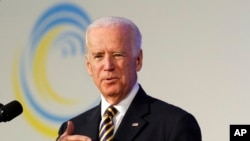The political uproar over Israeli Prime Minister Benjamin Netanyahu's plans to address the U.S. Congress next month continues to smolder. On Friday, the office of Vice President Joe Biden said he was expected to be traveling abroad and would not attend the speech.
Biden, who as vice president also serves as president of the Senate, would normally attend a foreign leader's address to a joint session of Congress, seated prominently behind the visiting leader.
Republican House Speaker John Boehner of Ohio started the controversy when he invited Netanyahu to address lawmakers March 3, two weeks before Israeli elections. The move angered the White House and some Democratic lawmakers, because the White House was not consulted before the invitation was issued, a breach of protocol.
Boehner has admitted that he did not consult with the White House or the State Department, but he said Congress has a role to play in foreign policy and can invite foreign leaders. Boehner said he invited Netanyahu to speak about the dangers posed by the threat of an Iranian nuclear weapon and radical Islam.
Criticism of timing
The top Democrat in the House, Nancy Pelosi of California, has criticized the timing of the speech, saying the floor of the House should not be exploited for political reasons.
Pelosi said the speech comes as international talks with Iran on its nuclear program are at a critical juncture, and that their success should not be jeopardized by Congress' flexing its muscle. She also said the timing is not appropriate because of the proximity to Israel's elections.
Asked whether she would attend, Pelosi said she planned to do so "as of now," but felt it would be better if the speech were postponed.
Several prominent Democrats have said they will not attend the speech, including civil rights icon Representative John Lewis of Georgia and the new chair of the Congressional Black Caucus, G.K. Butterfield of North Carolina.
Some lawmakers have said privately that they feel torn between President Barack Obama and Netanyahu, who has already addressed a joint meeting of Congress twice and received very warm, enthusiastic receptions. Support for Israel among members of Congress has always been solidly bipartisan.
A number of Republican lawmakers are voicing strong support for the planned speech. Republican Representative Adam Kinzinger of Illinois told VOA that he wanted to hear what Netanyahu has to say, and that it was ironic that the White House was complaining about not being consulted. The president has announced a number of major shifts in foreign policy without consulting Congress, Kinzinger said.
Bipartisanship assumed
Deputy Israeli Foreign Minister Tzachi Hanegbi told Israeli radio Friday that Netanyahu had trusted that the invitation Boehner extended to him was bipartisan; that now appears not to have been the case.
Hanegbi said the prime minister was not planning to cancel or postpone the speech but was making a huge effort to make clear to Democratic lawmakers that giving the speech was not an attempt to flout Obama.
Ron Dermer, Israel's ambassador to the U.S., and Knesset Speaker Yuli Edelstein met with lawmakers on Capitol Hill this week to try to calm the furor and prevent a possible boycott of the speech by some Democrats.
Some Democrats suggested that Netanyahu could meet privately with Democratic and Republican caucus groups next month, instead of giving a formal speech to a joint session so close to the Israeli elections.




